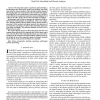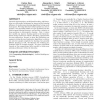458 search results - page 38 / 92 » Q-Decomposition for Reinforcement Learning Agents |
TSMC
2002
13 years 7 months ago
2002
By using other agents' experiences and knowledge, a learning agent may learn faster, make fewer mistakes, and create some rules for unseen situations. These benefits would be ...
ATAL
2009
Springer
14 years 2 months ago
2009
Springer
Improving the sample efficiency of reinforcement learning algorithms to scale up to larger and more realistic domains is a current research challenge in machine learning. Model-ba...
ATAL
2006
Springer
13 years 11 months ago
2006
Springer
Factored representations, model-based learning, and hierarchies are well-studied techniques for improving the learning efficiency of reinforcement-learning algorithms in large-sca...
ATAL
2003
Springer
14 years 29 days ago
2003
Springer
Much emphasis in multiagent reinforcement learning (MARL) research is placed on ensuring that MARL algorithms (eventually) converge to desirable equilibria. As in standard reinfor...
ICML
2006
IEEE
14 years 8 months ago
2006
IEEE
How should a reinforcement learning agent act if its sole purpose is to efficiently learn an optimal policy for later use? In other words, how should it explore, to be able to exp...


